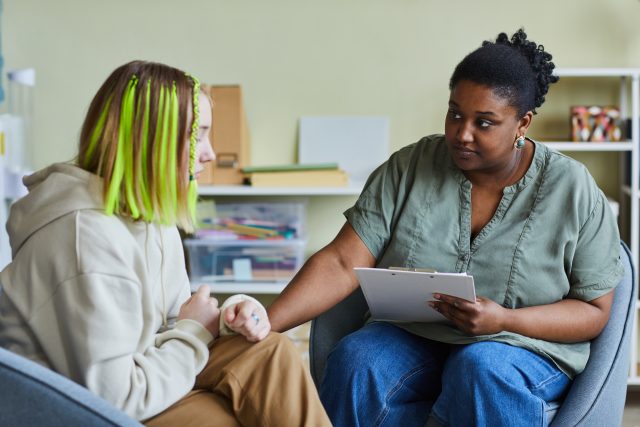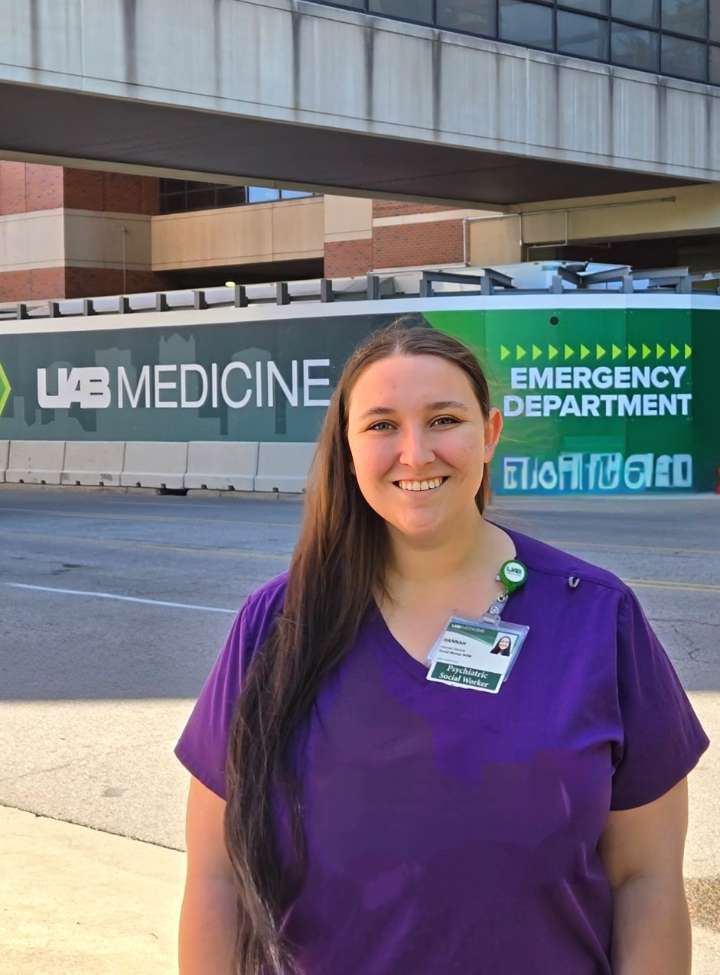
Where there is a need, there is a social worker, says Hannah Rose Harkins, a social worker in UAB Medicine’s Center for Psychiatric Medicine. Her statement is echoed by the job market for social work which is growing faster than average for all occupations, according to the United States Department of Labor’s statistics.

Jobs for social workers are projected to increase seven percent by 2032. Those with degrees in social work are afforded many different options ranging from large and small agencies, schools, hospitals, clinics, residential facilities and industries. The many fields of social work practice include children and families, poverty and income maintenance, mental health, substance abuse, developmental disabilities, medical and health care, criminal justice, gerontology, community organization, and policy development.
“Since the profession of social work heavily involves public service, it is for individuals with a passion to serve and better communities,” said Laurel Hitchcock, Ph.D., associate professor in the University of Alabama at Birmingham College of Arts and Sciences’ Department of Social Work and director of the Bachelor of Science in Social Work Program.
Translating the passion for helping into a career
Harkins was searching for an avenue to pursue her passion for helping people and landed in the field of social work, which turned out to be the perfect fit for her. She graduated from UAB with a master’s degree in medical and clinical social work in fall 2022, a unique program in which students receive advanced clinical training using a model of evidence-based education in a resource-rich setting. The program emphasizes extensive hours of fieldwork alongside course requirements.
“After graduating from Mississippi College, I was applying for a master’s degree, and I knew I wanted to come to UAB because it offers an amazing master’s in medical and clinical social work, unlike anywhere else in the nation,” Harkins said. “With its interactions with the School of Public Health, the Marnix E. Heersink School of Medicine, and UAB Medicine, I knew I would able to learn anything medical that interests me.”
During her graduate studies, Harkins interned with UAB Medicine’s Center for Psychiatric Medicine, where she is now a full-time, licensed social worker. She works with psychiatric emergency patients by completing psychiatric evaluations and assessments, crisis intervention and de-escalation, handling referrals to outside facilities such as crisis centers and shelters, transportation needs, finding available resources for food, rent, bills assistance, and making appointments for therapy, and psychiatry.
“Having an internship in my field of interest has been invaluable in my career,” Harkins said. “The internship provided a sheltered environment to learn and practice my skills safely under the supervision of a licensed professional and it gave me the confidence of ‘I can do this.’”
The internship was a way for Harkins to apply what she was learning in her courses to her field experience and vice versa. For example, she learned about the bio-psychosocial model, which systematically considers the complex interactions between biological, psychological, and social factors to understand health in her classes, and applies it to her practical work to date.
“The main thing you learn in social work is that there is a bigger picture,” Harkins said. “When you look at the bio-psychosocial model and human behavior in social environments, you realize there are usually events behind behaviors and actions. People feel a lot more comfortable and are willing to work with the treatment team when you seek to understand not just the crises, but what has been going on in their lives. That is the gateway to providing quality care.”
Harkins enjoys making a difference in the lives of patients she serves and enjoys the work that is not monotonous with every day bringing a new person with a new story.
“The most important thing as a social worker is building rapport,” Harkins said. “It is even more important to build rapid rapport in emergency settings. This will best help the patients understand their needs so we can meet them where they are.”
UAB Social Work Partnership
In 2024, UAB has launched a new initiative called the Social Work Partnership, aiming to bring together social workers across the UAB enterprise to grow and support a strong network of social workers that can enhance the health and well-being of the communities that UAB currently serves. Another goal of the partnership is to integrate the study and practice of social work to inform social work research and curriculum.
“We want to ensure that we are training the future workforce of social workers, well-equipped with the skills needed to best serve our communities in an ever-evolving environment,” Hitchcock said. “By leveraging the diverse and extensive resources within the UAB Enterprise through this partnership, we will be able to make a lasting impact on our students and community.”
According to Harkins, this partnership will help patients, students, and social workers and will be an opportunity to show the value of the profession, encouraging others to join the field and fulfill the growing need for social workers.
“UAB is huge; it has everything from trauma to transplant, to psychiatry to women’s and infants center and more,” Harkins said. “Any student who wants to specialize in anything medicine-related will have a connection to make that happen at UAB. There were a lot of students in my class, and we were all able to pursue areas of our interest. This partnership is going to enhance that.”
Like Harkins’ role at UAB in psychiatric emergency services that involves connecting with psychiatrists, residents, and many teams across disciplines, the field of social work demands extensive communication and a vast network.
“The partnership will enhance patient care because social workers will have a strong network to reach out to,” Harkins said. “Because sometimes our patient may come to us with a need that we may lack experience in. This network of professionals will help social workers contact the right people at the right time so we can deliver quality services to our patients.”




